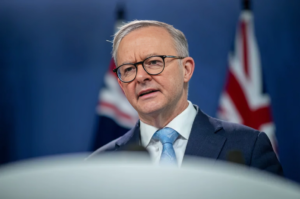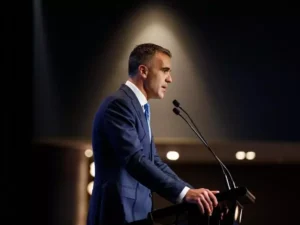The Australian government is moving forward with significant legislation that could see a ban on children use of social media for those under the age of 16. This legislation, expected to be introduced by the end of the year, will impose a minimum age limit for accessing platforms such as Facebook and Instagram. However, the exact age cut-off will not be revealed until the government’s current trial of age verification technology has been completed.
This legislative push follows recent proposals made by the South Australian government, which introduced changes earlier this week that would force social media companies to ban children aged 13 or younger. Companies that fail to comply could face heavy fines. This initiative has now been formally adopted by both major political parties, with the Coalition also expressing its commitment to enforcing these changes. In June, they indicated they would pursue a bipartisan agreement to curb children’s use of social media.

Australian Prime Minister Anthony Albanese commented on the development, stating that the government is considering an age restriction ranging between 14 and 16 years for social media platforms. However, the Prime Minister personally leans towards setting a “higher limit” to ensure stricter protection for young users. “The real challenge lies in implementing this effectively,” Mr. Anthony Albanese remarked during an interview with ABC News Breakfast. “It’s not something that’s easy to solve, but we are committed to finding a national approach rather than allowing individual states to implement their own solutions.”
Mr. Anthony Albanese also expressed concerns that children’s use of social media is taking away from real-world experiences with family and friends. “Parents are worried sick about this, and we understand the challenges they face in navigating this new digital landscape,” he said. “The safety and mental well-being of our young people is our top priority. Parents want their children off their phones and out on the sports field, and I agree.”
The upcoming legislation is being drafted in collaboration with state and territory governments, informed by the ongoing review led by South Australia. A trial is already underway to explore potential methods for verifying the age of those attempting to access social networks and adult websites. Currently, most platforms only require users to tick a box confirming they are over a certain age, a method which has proven insufficient in preventing underage access.

In response to these concerns, South Australian Premier Peter Malinauskas has called for immediate action, citing the harmful effects of social media addiction among young users. “The evidence is clear: early exposure to social media is having a detrimental effect on our children. This is comparable to the risks posed by cigarettes or alcohol. When something poses such a significant risk to children, governments have a responsibility to act.”
Nonetheless, the introduction of stricter age verification methods has raised concerns among privacy advocates. Critics, including experts like Queensland University of Technology’s Daniel Angus, have warned that while these measures might help address the issue in the short term, they could lead to unintended consequences. “We could see platforms finding ways to bypass these regulations, as they have in the past with other types of legislation, like the News Media Bargaining Code,” Angus explained.
In May, Belinda Barnett, a senior lecturer in communications at Swinburne University, voiced similar concerns. While she acknowledged the importance of age verification, Barnett stressed that it would be challenging to implement without collecting personal information from Australian citizens, which raises significant privacy issues.

As the Australian government’s trial continues, companies will be invited to participate in a consultation process aimed at refining the verification tools and ensuring the effectiveness of future regulations. Once the trial is complete, the government will be empowered to enforce age restrictions on social media platforms, ensuring that children use of social media is properly regulated.
In addition to these domestic developments, age restrictions on social media access have become a topic of international debate. Governments worldwide are grappling with the challenges of keeping young people safe online while balancing concerns about privacy, freedom of expression, and technological innovation.


